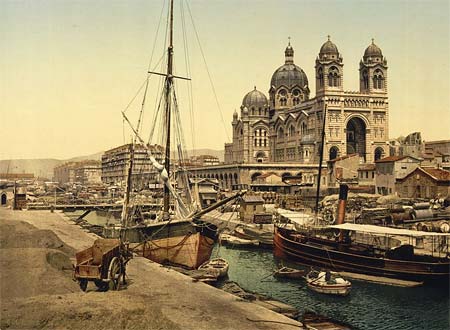


 Well, that's only my first quibble... my real quibble was with the portrayal of Catherine of Aragon, Henry VIII's first wife. By the time Anne Boleyn came along, Catherine had had at six pregnancies, five of whom were miscarriages, still births, or died in infancy. Only Mary survived. She was, by all accounts, at 45 years of age very stout ("as wide as she is high"), gray-haired, wrinkled, and not nearly as attractive as the lady who portrayed her (see right). Once again, even historical women can't lose their looks in modern media...
Well, that's only my first quibble... my real quibble was with the portrayal of Catherine of Aragon, Henry VIII's first wife. By the time Anne Boleyn came along, Catherine had had at six pregnancies, five of whom were miscarriages, still births, or died in infancy. Only Mary survived. She was, by all accounts, at 45 years of age very stout ("as wide as she is high"), gray-haired, wrinkled, and not nearly as attractive as the lady who portrayed her (see right). Once again, even historical women can't lose their looks in modern media... But enough about that, let's get to the real danger: politics.
 |
| Sir Thomas More |
 Anyway, today we have Wolf Hall and Bring Up the Bodies, in which Sir Thomas More is less saintly and Thomas Cromwell less evil. But there's nothing much you can do about Henry VIII. The truth is, politics (not to mention marriage! is always a deadly game when you are dealing with an absolute monarch, who can have you killed at any moment, innumerable nobles who are all scrambling for scraps from said monarch's table, and a brewing religious war. And the irony is that it didn't help that Henry VIII was an enlightened, extremely well-educated monarch: the true philosopher prince everyone had always dreamed of. Be careful what you wish for: all that enlightenment, all that education, all that religious training combined with the divine right of kings meant that Henry thought he was always right about everything. Especially when he wanted to get a new wife or more money, or be Head of the Church in order to get a new wife and more money.
Anyway, today we have Wolf Hall and Bring Up the Bodies, in which Sir Thomas More is less saintly and Thomas Cromwell less evil. But there's nothing much you can do about Henry VIII. The truth is, politics (not to mention marriage! is always a deadly game when you are dealing with an absolute monarch, who can have you killed at any moment, innumerable nobles who are all scrambling for scraps from said monarch's table, and a brewing religious war. And the irony is that it didn't help that Henry VIII was an enlightened, extremely well-educated monarch: the true philosopher prince everyone had always dreamed of. Be careful what you wish for: all that enlightenment, all that education, all that religious training combined with the divine right of kings meant that Henry thought he was always right about everything. Especially when he wanted to get a new wife or more money, or be Head of the Church in order to get a new wife and more money. When Henry made himself Head of the Church of England (with help from Cranmer, Archbishop of Canterbury), he put everybody in England on the spot: who were you going to side with, Henry or the Pope? Most sided with Henry because the Pope was foreign, so the hell with him. But for many - most famously Thomas More, but also John Fisher, and 137 other priests, friars, and laypeople - it became a matter of conscience, and they were willing to die over it. And did. Just as, later, Mary I ("Bloody Mary") executed almost 300 Protestants, including Archbishop Cranmer. There is nothing worse than being in the middle of a religious civil war...
NOTE: One of the problems with today's Middle East (which has one great big fat religious civil war right in the middle of it) and Middle Eastern politics is that too many Americans think the Sunni-Shiite split is much ado about nothing, and what they're really fighting about is us. (1) We have got to quit flattering ourselves and (2) think back to the Tudors. Or, better yet, the European Wars of Religion of 1540s-1648.Back to Henry VIII: one fairly unique thing that he did was change the government of England - briefly - when he made Thomas Cromwell, the blacksmith's son, Lord Chancellor of England. This was pretty unprecedented. Yes, there were low-born churchmen from time immemorial, mainly because the Church took everybody and anybody, and it was the one place where you could rise from peasant to Cardinal to even pope. Pope Sylvester II, the peasant's son. Thomas Wolsey, the butcher's boy. Thomas Becket, the merchant's son. But that's the church. For the real ruling of the kingdom, for office and money and lands and a king's favor, you had to be noble. Until Cromwell.
 |
| Anne of Cleves |
 |
| The young Louis XIV |
So, when he came to full age and power, Louis decided that the only purpose of the nobility was to praise and support him, so he took away every shred of power from them. His cabinet was almost entirely of (often brilliant) bourgeoisie, especially
 |
| Colbert |
- Jean-Baptiste Colbert, Finance Minister, who actually managed to keep Louis XIV solvent despite his royal tendency to spend money like water on everything from royal mistresses, royal chateaux, and piss-ant wars.
- Michel Le Tellier, Chancellor of France, who nationalized the army. Pity it was for Louis XIV.
Today, of course, we take it for granted that bureaucracy is done by, of, and for the commons. But it's still deadly. Disgruntled office workers lead to regular crime scenes on the national news. And there's more than one way to skin a cat: if you don't want to risk murder, there's always slander, and in today's age of cyber-bullying, it's easier than ever to destroy someone's reputation and career.
Anne Boleyn would be smeared in every chat room; Cromwell would be trashed on the Drudge Report or Daily Kos and perhaps both; Cranmer would be the idol of Patheos until he wasn't; the tweets would have been nonstop about Jane Seymour; the cyber-whispering would be constant, and at the heart of it all would be the King, strutting and posturing without pause, even when his footsteps walked through blood.
"Kings are earth's gods; in vice their law's their will." Shakespeare, Pericles, Prince of Tyre
— or —
“You can be merry with the king, you can share a joke with him. But as Thomas More used to say, it's like sporting with a tamed lion. You tousle its mane and pull its ears, but all the time you're thinking, those claws, those claws, those claws.” Hilary Mantel, Bring Up the Bodies

















